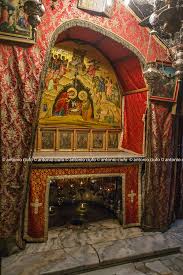 All Christian churches prepare for the feast of the birth of Christ by some sort of period of penance. The Western church calls this the period of Advent, connected with the Latin word for “come,” since we are waiting for Christ to come into our lives. We may be celebrating an event in the past, the birth of Jesus, the first coming of God into our world, but we are also celebrating the present, God coming into our own lives and into the world of today, and the future expectation of Christ’s second coming, when he will come in glory to judge tote world in righteousness.
All Christian churches prepare for the feast of the birth of Christ by some sort of period of penance. The Western church calls this the period of Advent, connected with the Latin word for “come,” since we are waiting for Christ to come into our lives. We may be celebrating an event in the past, the birth of Jesus, the first coming of God into our world, but we are also celebrating the present, God coming into our own lives and into the world of today, and the future expectation of Christ’s second coming, when he will come in glory to judge tote world in righteousness.
The Roman Church once began the Christmas preparation on St. Martin’s Day, Nov. 11, which gave forty days until the winter solstice on Dec. 21, and the church of Milan in Italy still has a forty-day preparation beginning on Nov. 15.
Traditionally, the Byzantine Church also begins its Christmas preparation on Nov. 15. Since this follows the feast of St. Philip the Apostle, it is called the Philip’s Fast. There is a legend about St. Philip, that when he was about to be martyred, he delayed his entrance into heaven by forty days in order to do penance for the sake of his persecutors. This is certainly only a legend, since Philip was not connected with the pre-Christmas fast until the ninth century, but it does point out one aspect of fasting – it is an act of charity for others. Some contemporary groups have expressed this by introducing the custom of setting aside the money they save by fasting to buy food for the poor. St. Philip is the apostle who leads us to Christ. When Jesus called him to be a disciple, his first action was to go and tell Nathaniel. When Nathaniel questioned him about Jesus, Philip replied, “Come and see” (Jn 1:46). Later in the Gospel, some Greeks (Gentiles, representing all nations) wanted “to see Jesus” (Jn 12:21), and it is Philip and Andrew that lead them to Christ. At the Last Supper, it is Philip that asks the question, “Master, show us the Father,” and Jesus replies, “Whoever has seen me has seen the Father” (Jn 14:8¬9). In the face of Jesus our Lord, we are able to see the love of the Father for us. The holy Apostle Philip, therefore, leads us to Christmas, to see for the first time the face of God, who came into the world to break down the barriers between humanity and God (Eph. 2:14).
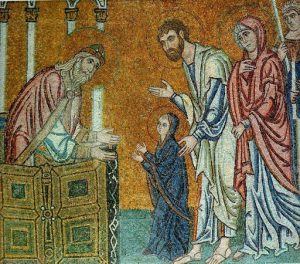 Tomorrow, November 21, is a holy day. The Divine Liturgy will be served at 9:00 a.m. in both English and Ukrainian.
Tomorrow, November 21, is a holy day. The Divine Liturgy will be served at 9:00 a.m. in both English and Ukrainian.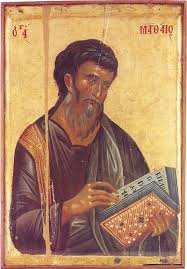 At the beginning of the Fast before Christmas, we celebrate the feast of St. Matthew, who wrote one of the Gospels of the birth of our Lord. (St. Luke is the other.) St. Matthew’s purpose was to show how the prophecies of the Covenant were fulfilled in Jesus. Therefore, he is the son of Abraham and the Son of David. He fulfills the prophecy of Isaiah that a virgin would give birth, the prophecy of Micah that he would be born in Bethlehem, the prophecy of Jeremiah that the innocents would die, and that he would be called a Nazorean. Matthew tells us of the visit of the Magi, the massacre of the innocents, and the flight into Egypt. It is also Matthew who presents to us the model figure of St. Joseph. Just as the Joseph of the Old Testament saved his people in Egypt, so the Joseph of the New Testament saves the hope of the people, Jesus, by taking him to Egypt. We have no better model of human fatherhood. Joseph is a righteous man (Matthew 1:19), who is open to God’s revelation through his messenger angel that the child of Mary is of God, a faith that goes beyond human knowledge. It is Joseph who protects the child, his foster son, so that Jesus, the Savior, could someday fulfill the plan of the heavenly Father. It is Joseph who re-orders his whole life for the sake of his beloved child. Joseph, then, is a model of divine fatherhood, “from whom every fatherhood in heaven and on earth is named. (Ephesians 3:15)”
At the beginning of the Fast before Christmas, we celebrate the feast of St. Matthew, who wrote one of the Gospels of the birth of our Lord. (St. Luke is the other.) St. Matthew’s purpose was to show how the prophecies of the Covenant were fulfilled in Jesus. Therefore, he is the son of Abraham and the Son of David. He fulfills the prophecy of Isaiah that a virgin would give birth, the prophecy of Micah that he would be born in Bethlehem, the prophecy of Jeremiah that the innocents would die, and that he would be called a Nazorean. Matthew tells us of the visit of the Magi, the massacre of the innocents, and the flight into Egypt. It is also Matthew who presents to us the model figure of St. Joseph. Just as the Joseph of the Old Testament saved his people in Egypt, so the Joseph of the New Testament saves the hope of the people, Jesus, by taking him to Egypt. We have no better model of human fatherhood. Joseph is a righteous man (Matthew 1:19), who is open to God’s revelation through his messenger angel that the child of Mary is of God, a faith that goes beyond human knowledge. It is Joseph who protects the child, his foster son, so that Jesus, the Savior, could someday fulfill the plan of the heavenly Father. It is Joseph who re-orders his whole life for the sake of his beloved child. Joseph, then, is a model of divine fatherhood, “from whom every fatherhood in heaven and on earth is named. (Ephesians 3:15)”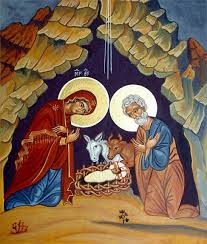 Lord Jesus, You have come so many times to us and found no resting place; forgive us for our overcrowded lives, our vain haste, and our preoccupation with self. Come again, O Lord, and though our hearts are a jumble of voices and our minds overlaid with many fears, find a place however humble, where You can begin to work Your wonder as You create peace and joy within us. If in some hidden corner, in some out-of-the-way spot, we can clear away the clutter and shut out the noise and darkness, come be born again in us, and we shall kneel in perfect peace with the wisest and humblest of men.
Lord Jesus, You have come so many times to us and found no resting place; forgive us for our overcrowded lives, our vain haste, and our preoccupation with self. Come again, O Lord, and though our hearts are a jumble of voices and our minds overlaid with many fears, find a place however humble, where You can begin to work Your wonder as You create peace and joy within us. If in some hidden corner, in some out-of-the-way spot, we can clear away the clutter and shut out the noise and darkness, come be born again in us, and we shall kneel in perfect peace with the wisest and humblest of men. All Christian churches prepare for the feast of the birth of Christ by some sort of period of penance. The Western church calls this the period of Advent, connected with the Latin word for “come,” since we are waiting for Christ to come into our lives. We may be celebrating an event in the past, the birth of Jesus, the first coming of God into our world, but we are also celebrating the present, God coming into our own lives and into the world of today, and the future expectation of Christ’s second coming, when he will come in glory to judge tote world in righteousness.
All Christian churches prepare for the feast of the birth of Christ by some sort of period of penance. The Western church calls this the period of Advent, connected with the Latin word for “come,” since we are waiting for Christ to come into our lives. We may be celebrating an event in the past, the birth of Jesus, the first coming of God into our world, but we are also celebrating the present, God coming into our own lives and into the world of today, and the future expectation of Christ’s second coming, when he will come in glory to judge tote world in righteousness.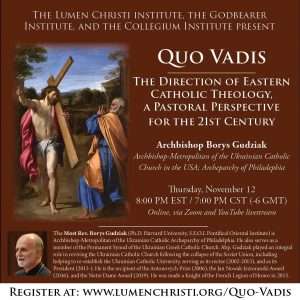
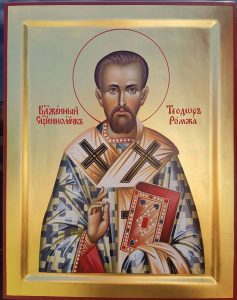
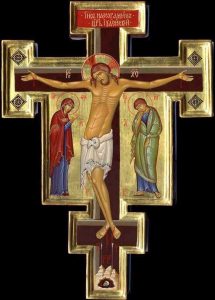 The Exaltation of the Life-giving Cross of our Lord Jesus Christ
The Exaltation of the Life-giving Cross of our Lord Jesus Christ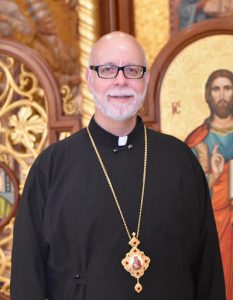 Our parish will be hosting the visit of Bishop Paul Patrick Chomnycky, OSBM, on Sunday, September 13. He will be serving both Divine Liturgies at 9:00 a.m. and 10:30 a.m.
Our parish will be hosting the visit of Bishop Paul Patrick Chomnycky, OSBM, on Sunday, September 13. He will be serving both Divine Liturgies at 9:00 a.m. and 10:30 a.m.